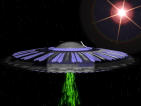of nugent, seger, and the politics of the atom

ted nugent: is he a pion, a lepton, or a kaon?
I got badly scratched by the house feline yesterday. I was afraid I would come down with cat scratch fever, but luckily the incubation period passed without symptoms. Thank God. I try to avoid catching any diseases that share their names with Ted Nugent songs, which made last year’s crippling bout of Wango Tango particularly upsetting.
I'll ruminate on Ted today, but save my praise for Bob Seger. If you haven’t checked him out lately, you really should. He’s under-appreciated. And I’ll wind up suggesting how modern politics can be explained using particle physics. Can you guess which particle Don Rumsfeld is? Bear with me, and maybe it will make more sense that either you or I are expecting right now.
You may remember Ted Nugent, the marginally successful rock singer and guitarist from the 70’s. The Michigan-based Nugent, who is almost universally looked down upon by his fellow musicians, made a name for himself as an aggressively right-wing pro-meat eating hunter. He has been able to extend a languishing entertainment career by embracing these conservative positions, which I guess makes him the musical Dennis Miller. Or makes Christopher Hitchens the literary Ted Nugent.
But (and this is important enough to break the rules and start a paragraph with “but”) – I’m not going to go after “the Nuge,” as he is called. No. Hitchens was enough. Joseph Campbell used to quote the old Irish saying, “Is this a private fight or can anyone join in?” Nevertheless, there are some bar brawls even I don’t consider worth jumping into. (I shouldn’t end a sentence with “into”, either – but it doesn’t sound right to say “There are some bar brawls into which even I won’t consider jumping.”)
I admit to having at times been morbidly fascinated with Ted Nugent. I once saw him perform and, while I wasn’t moved, he seemed to induce a fist-pumping, beer-spraying, halter-top-removing response from the men and women (respectively) in the crowd. My fascination was with Ted, though – his extraordinary self-confidence in the absence of apparent musicianship was extraordinary to watch. And I mean that in (sort of) a good way.
Michigan
(click on "Permalink Page" to talk more Seger, analyze the Nuge, and help create the new field of politico-physics)
As a native blue-stater, Seger encountered the same anti-longhair violence I and others did in other parts of the country back in the day. In the mournful “Turn the Page,” his masterpiece description of life on the road, he captures the feeling we all had on entering a back-country diner in “counterculture” dress and facing the hostile stares:
Some times you can’t hear ‘em talk, other times you can
it’s all the same clichés, “Is that a woman or a man?”
but there’s more them than there are of us, no way to make a stand
Seger’s crowning achievement for me comes in the last verse of “Night Moves,” an unfortunately overplayed but still powerful ballad. The song starts as a relatively shallow reminiscence on his first sexual experience. It has a strong melody, and builds up in intensity before dropping away to a near-whisper for these final words, made even more powerful by the way they seem to appear as a complete non sequitur:
Woke last night to the sound of thunderIt has a powerful, haiku-like feel and structure, even down to the seasonal reference traditionally required for that form of poetry. I said it felt like a non sequitur, but of course it’s not. Its elegiac tone summons the loss of youth, the yearning for what’s gone, and the sense of the nearness of death. It gives the recollections of backseats and breasts a much deeper meaning, and is the work of a very gifted writer.
How far off? I sat and wondered
started humming a song from 1962
ain’t it funny how the night moves
with Autumn closing in?
For example, is Bush alone the nucleus, or is Cheney kind of a co-nucleus with him? If they share, is Bush the protons and Cheney the neutrons or vice versa? Are the Cabinet members the electrons? Did Colin Powell have a negative charge, because he wasn’t “nucleus-minded” enough, and is that why he was repelled? Was he that electron you see getting expelled in those physics experiments? Is the reason Bush won’t fire anybody for incompetence because they are bound to him – the nucleus – by the “strong force”? Is the rule of law the “weak force”?
If the cabinet members are electrons, who are the other particles – muons, for example? Muons are in cosmic rays and crash into other particles, but they’re unstable and quickly decay into something simpler. They are sort of like Libertarians, most of whom seem to winding up taking a straight conservative party line. Neutrinos have very little mass and pass through most things without any effect. Plus they change a lot, although they always stay neutrinos. They’ve gotta be your Democrats, right?
And that’s what I have to say because I got scratched by a cat.

